Films considered good in personal option or through critical/commercial success that for whatever reason don’t use the potential their source material offers. Some exclude important details, some change major plot points etc. If anybody can think of films that didn’t get mentioned here they think deserved to be, or even disagree with list items, feel free to comment.
I’m not an expert on every single listed book , but with all of them I at least know enough to acknowledge things that could’ve done well in film.
Listed in film release order, this is Generally spoiler free APART FROM vague reveals in the Animal Farm and Hunchback of Notre Dame Sections. Went all out with Wizard of Oz; not sure spoilers exist since even the Dinosaurs used to say how old that film was.
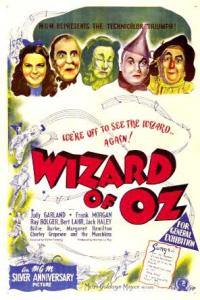
- The Wizard Of Oz – L Frank Baum (Technically The WONDERFUL Wizard of Oz)
Arguably one the most acclaimed films of all time. This summary won’t deny it has strength even if by now it’s slightly overrated.
But after reading (ummm listening to) the book the film seems full of missed opportunities . Not only does the film dismiss all of the events as a possible dream (in Baum’s novel Dorothy’s experiences in Oz were genuine) undermining a huge portion of what’s been shown so far, the film also oversimplifies the Tin Man and Cowardly Lion.
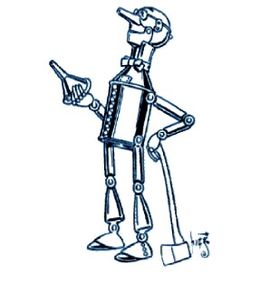 In the book the Tin man was established to have previously been a munchkin named Nick Chopper, whose axe was enchanted due to a bargain between a witch and a munchkin woman who didn’t wish for him to marry his betrothed. The axe chopped off parts of his body, so he consulted a tinsmith to gain prosthetics until he was entirely crafted from them. While showing this in a family film would naturally be ill advised, a passing reference to the events even if slightly revised to appear less sinister, would’ve added character depth and made for a stronger established universe. Still, seems odd that he didn’t just buy a new axe or apply for a different career after the first few amputations – maybe it’s him who needs brains rather than Scarecrow.
In the book the Tin man was established to have previously been a munchkin named Nick Chopper, whose axe was enchanted due to a bargain between a witch and a munchkin woman who didn’t wish for him to marry his betrothed. The axe chopped off parts of his body, so he consulted a tinsmith to gain prosthetics until he was entirely crafted from them. While showing this in a family film would naturally be ill advised, a passing reference to the events even if slightly revised to appear less sinister, would’ve added character depth and made for a stronger established universe. Still, seems odd that he didn’t just buy a new axe or apply for a different career after the first few amputations – maybe it’s him who needs brains rather than Scarecrow.
Additionally The Tin Man actually battled in the book, being soft hearted until an innocent life was endangered, at which point he went into full chopping action…or should that be… Axe-tion mode (sorry). His film parallel spends his time either standing still or crying…or when he’s feeling really adventurous, both.
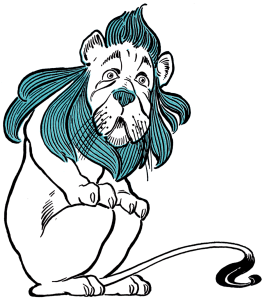 The Cowardly Lion gets similar treatment. In the book, he too often displays strength and formidability when necessary. At one point he decapitates a giant spider! Although it’s understandable why this isn’t onscreen, it seems misguided to remove ALL of his usefulness. A point was constantly made in the book that despite of being terrified throughout the journey , he actively decided to partake and even save the lives of other friends- ironically making him the bravest of the group , constantly choosing to face fears. In the film, the lion’s involvement in the journey isn’t always voluntarily; he’s often physically forced to join the party by the Scarecrow and the Tin man, so he’s not that brave .This causes further issues with Tin Man– dragging a frightened creature into situations they clearly don’t want or even need to be in actually seems heartless. This is something conveniently absent from the Wizard’s discussion of Tin man’s kindness. Although, since he cons people into thinking he’s powerful and sends a child off to kill a witch he’s morally warped himself . In essence, the darkness of the book, as well as the depth of character, sense of place (and the fact it actually was a place in-story) were so vital in Baum’s novel that producing a film that omitted or changed these details was an….interesting choice. Even more confusingly, the book wasn’t that known at the time of filming so associating the film with the book via title wouldn’t have even necessarily attracted crowds.
The Cowardly Lion gets similar treatment. In the book, he too often displays strength and formidability when necessary. At one point he decapitates a giant spider! Although it’s understandable why this isn’t onscreen, it seems misguided to remove ALL of his usefulness. A point was constantly made in the book that despite of being terrified throughout the journey , he actively decided to partake and even save the lives of other friends- ironically making him the bravest of the group , constantly choosing to face fears. In the film, the lion’s involvement in the journey isn’t always voluntarily; he’s often physically forced to join the party by the Scarecrow and the Tin man, so he’s not that brave .This causes further issues with Tin Man– dragging a frightened creature into situations they clearly don’t want or even need to be in actually seems heartless. This is something conveniently absent from the Wizard’s discussion of Tin man’s kindness. Although, since he cons people into thinking he’s powerful and sends a child off to kill a witch he’s morally warped himself . In essence, the darkness of the book, as well as the depth of character, sense of place (and the fact it actually was a place in-story) were so vital in Baum’s novel that producing a film that omitted or changed these details was an….interesting choice. Even more confusingly, the book wasn’t that known at the time of filming so associating the film with the book via title wouldn’t have even necessarily attracted crowds.
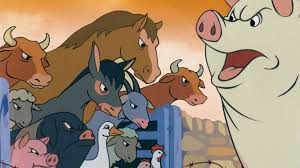
2. Animal Farm-George Orwell
The artwork and pacing is fairly impressive and it feels surprisingly un-dated for a 1954 feature. Ok now the praise is over let’s say why it’s actually crap- ok maybe an exaggeration, anything for the bants. A short film, this’ll be a short summary. In general the plot stays faithful to Orwell’s triumphant text, but Like I am Legend the ending is entirely at odds with the novel’s whole message.
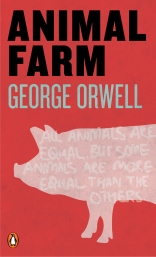 To elucidate; Orwell’s ending: Soz. Bad guys win sometimes. Film Ending: Good guys seem to win. This isn’t fully justified by child friendly intentions, since the film was originally released as X rated so never aimed at children (U on DVD these days – how times change). More irritatingly, the end would be satisfying in any other context, but in the context of an adaptation it’s devaluing. Orwell’s ending was also surreally chilling and captured the bleak nature of the book overall. As well as this change, many important character arcs are removed (Molly to name but one) or simplified e.g. Benjamin the Donkey- who’s role as a neutral was important- is the closest thing to a conventional hero the film has. In heroising the character he’s also made more boring; outside of his one act that labels him heroically he’s given no personality- losing his sarcastic charm. It’s generally possible that this personality change was done in desire of a more mainstream narrative – but when adapting a Novel on the Russian Revolution with farm animals, it’s probably too late already.
To elucidate; Orwell’s ending: Soz. Bad guys win sometimes. Film Ending: Good guys seem to win. This isn’t fully justified by child friendly intentions, since the film was originally released as X rated so never aimed at children (U on DVD these days – how times change). More irritatingly, the end would be satisfying in any other context, but in the context of an adaptation it’s devaluing. Orwell’s ending was also surreally chilling and captured the bleak nature of the book overall. As well as this change, many important character arcs are removed (Molly to name but one) or simplified e.g. Benjamin the Donkey- who’s role as a neutral was important- is the closest thing to a conventional hero the film has. In heroising the character he’s also made more boring; outside of his one act that labels him heroically he’s given no personality- losing his sarcastic charm. It’s generally possible that this personality change was done in desire of a more mainstream narrative – but when adapting a Novel on the Russian Revolution with farm animals, it’s probably too late already.
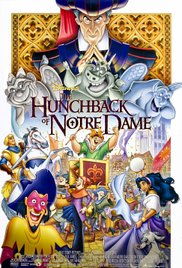
3. The Hunchback of Notre Dame- Victor Hugo
Far and away one of the best entries in the Disney Animated Canon, which is some achievement. Artwork is fantastic, Songs are exceptionally written and performed, and the majority of characters are well rounded or at least expertly voiced. The one major issue is that the narrative is almost completely different to Victor Hugo’s Novel Notre Dame De Paris. Listing all the differences individually would make this a longer read than the book itself, so let’s just go for a few highlights. One surprising detail is that Phoebus is actually a villain in the book and there was no conventional love interest for Esmeralda- maybe forgivable, they don’t need more than one villain. They also remove the bumbling poet Gringoire, whose awkwardness and lack of poetic skills show missed opportunities to use a comical Disney sidekick who’s involvement actually makes sense (Unlike the gargoyles- who I’ll talk about later).
Quasimodo of the film starts out basically incorruptibly innocent and the years he’s spent alone don’t entirely effect how he speaks to others, he’s slightly shy and very insecure but basically copes fine in conversations when given chance. Allowing him slightly more social ineptitude would’ve suited a film this dark . It also would’ve allowed his more violent acts towards the film’s end, such as him pouring boiling oil onto guards seem less uncharacteristic. He also kills Frollo in the Book- which would’ve been a more satisfying film end. Also, after trying to burn strangers to death- killing his 20 yearlong abuser wouldn’t be crossing a moral line.
Also while there’s plenty of character depth overall; Film Frollo is simplified. Book Frollo begins as a genuinely good person who’s driven mad by lust and through desperation commits unsavoury acts that he feels actual guilt about- supposedly showing how a completely celibate man of the church would react to the previous alien feeling of sexual desire. Here, the first things he does is kill a woman and then prepare to kill her baby; so was never winning the audiences hearts. Disney probably didn’t want the distinction between good and bad forces to be too complicated in a film for kids but Surely you also wouldn’t ideally want a villain with mass genocidal intent and the hero getting tied up and flogged just because of his deformity in a film for kids either. In general, Frollo’s increased villainy negates the usually justified argument that the changes were made to lighten the content.
Furthermore, the idea of the characters being either clearly good or clearly bad goes out the window thanks to Clopin. On one hand, he was happy with the prospect of hanging Quasimodo and Phoebus (sure he thought they were spies but this doesn’t automatically mean he should enjoy committing murder) but at the same time – sympathises with Quasimodo any time he’s narrating. His puppet collection doesn’t help clarify which side he’s more inclined to. Arguably, his actions both ways are too extreme to make a complex character and instead create a confusing one.
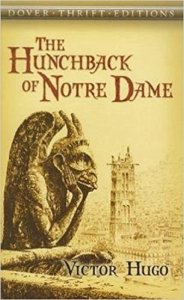 Annoyingly, a passage in the Novel sates how the monsters of Notre Dame are considered friends by the lonely Quasimodo. It might not seem like it from what I’ll say next but I genuinely like the Gargoyles. I always appreciate their type of behaviour from side characters. Establishing them as imaginary friends however, would show what years of loneliness can do in a subtle and child friendly way. Also, the imaginary factor would cleverly reference the Book. The film’s last scene though, where the Gargoyles use a catapult and one drops a brick on a guard’s head prove they’re really alive introducing unexplained magic in a film that’s otherwise magic free, excluding parlour tricks. I remember the brick thing because it seemed to be on every trailer on every video ever- sometimes on trailers for other films (Ok, that’s a lie). This stands out as one of the few times magic realism was a bad move, since it detracts from the more realistic threats and issues the film offers. No serious or faithful modernisation of this book will ever be made – mainly because Book Quasimodo’s bell covered red and purple coat, wherever he got it from, would be enough to prevent social ostracism and would earn him mad followers on Instagram.
Annoyingly, a passage in the Novel sates how the monsters of Notre Dame are considered friends by the lonely Quasimodo. It might not seem like it from what I’ll say next but I genuinely like the Gargoyles. I always appreciate their type of behaviour from side characters. Establishing them as imaginary friends however, would show what years of loneliness can do in a subtle and child friendly way. Also, the imaginary factor would cleverly reference the Book. The film’s last scene though, where the Gargoyles use a catapult and one drops a brick on a guard’s head prove they’re really alive introducing unexplained magic in a film that’s otherwise magic free, excluding parlour tricks. I remember the brick thing because it seemed to be on every trailer on every video ever- sometimes on trailers for other films (Ok, that’s a lie). This stands out as one of the few times magic realism was a bad move, since it detracts from the more realistic threats and issues the film offers. No serious or faithful modernisation of this book will ever be made – mainly because Book Quasimodo’s bell covered red and purple coat, wherever he got it from, would be enough to prevent social ostracism and would earn him mad followers on Instagram.
· Video here to prove Gargoyles existence and Quasi’s boiling oil business – side note; at 0:32 : HOW IS PHOEBUS THAT STRONG. HE’S NOT A SUPERHERO
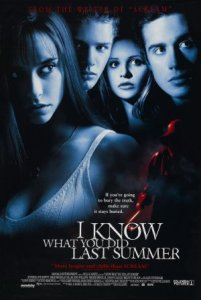
4. I know what You Did Last Summer – Lois Duncan
A really enjoyable film when accepted as the typical slasher it wanted to be. The film is fairly known at least by title but by now the book’s been totally forgotten- and possibly was even when the film came out. I know a lot of people will be surprised to find out there’s a book at all– and I only found out about it a week ago (about a week agoo week ago), but when I read the plot in detail I was disappointed it wasn’t the one used.
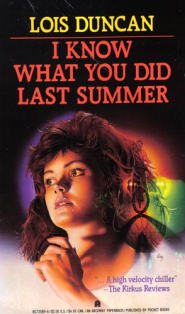 What comes from the film is standard slasher thrills. Given the source what could’ve come from the film was gripping character drama endless suspense and clever horror potential. What’s also good is there’s still death- well, that’s not GOOD generally, but from a dark storytelling point- so there’d still be a chance to explore the slasher side of cinema without going far from the source- and adding in extra depth while it’s available. In the book, the hit and run still happens (only this time it’s a child who’s the victim) but the antagonist has an entirely different identity, a debatably stronger motive and the reveal sounds more powerful. While there’s nothing wrong with a good slasher – if the accidental murder that gives the plot its drive (that wasn’t wordplay based on the car crash- legit’ accidental when first written) was altered slightly and names were changed, the filmmakers would’ve had a completely original story. It’s actually surprising this didn’t happen somewhere during production. Even more than with The Wizard of Oz , the book is so obscure the title alone wouldn’t mean a lot to audiences.
What comes from the film is standard slasher thrills. Given the source what could’ve come from the film was gripping character drama endless suspense and clever horror potential. What’s also good is there’s still death- well, that’s not GOOD generally, but from a dark storytelling point- so there’d still be a chance to explore the slasher side of cinema without going far from the source- and adding in extra depth while it’s available. In the book, the hit and run still happens (only this time it’s a child who’s the victim) but the antagonist has an entirely different identity, a debatably stronger motive and the reveal sounds more powerful. While there’s nothing wrong with a good slasher – if the accidental murder that gives the plot its drive (that wasn’t wordplay based on the car crash- legit’ accidental when first written) was altered slightly and names were changed, the filmmakers would’ve had a completely original story. It’s actually surprising this didn’t happen somewhere during production. Even more than with The Wizard of Oz , the book is so obscure the title alone wouldn’t mean a lot to audiences.
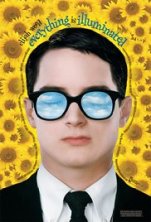
5. Everything Is Illuminated – Jonathan Safran Foer
Probably the least known title here, which is saddening because the book’s a work of genius. It’s also the best adapted film on the list, falling short on very few, but very important, points.
The plot concerns Alex and Jonathan, the former an English language Graduate From Russia the latter a more strait-laced aspiring author from America. Alex is hired as Jonathan’s translator on a Ukrainian trip focused on Jonathan’s genealogy.
Alex’s hilarious conversational hyperactive broken English commentary makes him the books best narrator and the film’s…..narrator. Yes that’s right, just the film’s narrator- they only went and reduced the narrator count didn’t they? .What makes this frustrating is the Book’s other narrator is Jonathan, who’s constantly onscreen. He has to be there, otherwise it’d just be Alex saying words, some of which might fit together. The removal of Jonathan’s narration means that MANY EVENTS HE REPORTS GO UNMENTIONED. While removing some was wise (His grandfather’s premature sex-life was needlessly weird) almost every other passage is vital or at least gives sense of place and history. Several (fictional) historical sections of the book were devoted to Jonathan’s grandparents’ relationship, which it seems especially bizarre to remove these since they form almost the ENTIRE PURPOSE OF THE TRIP THE FILM’S BASED AROUND. Showing clips of the past would further prove the film’s skill to balance comedy and drama, which is also paramount to the book. At least the present day narrative, or the only day narrative in the films case, remains unadulterated….for about half of the film. It gets to a certain point and Alex’s grandfather’s backstory undergoes unwelcome but forgivable changes that decreases the novel’s devotion to guilt and how good people lived in bad situations (WW2).
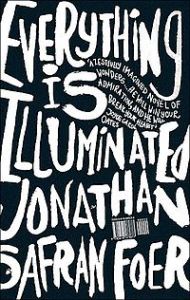 Alex’s own story is slightly simplified; far from the worst change, but Book Alex’s sexual boasts are lies to appear an absolute playa- in the film they’re true and he just is an absolute playa. This change is simple but surprisingly large (chill, it’s not a huge spoiler). This is a well-acted, well paced, thoroughly enjoyable piece of cinema. This being said, the extreme distillation (which removes all of the fantasy- therefore removes a genre) proves that sometimes details that are left out can be problematic.
Alex’s own story is slightly simplified; far from the worst change, but Book Alex’s sexual boasts are lies to appear an absolute playa- in the film they’re true and he just is an absolute playa. This change is simple but surprisingly large (chill, it’s not a huge spoiler). This is a well-acted, well paced, thoroughly enjoyable piece of cinema. This being said, the extreme distillation (which removes all of the fantasy- therefore removes a genre) proves that sometimes details that are left out can be problematic.
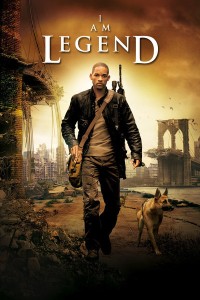
6. I am Legend -Richard Matheson
My least favourite film in this assortment, Will Smith is solid but, save for a few scenes; it’s ridiculously slow. In spite of this, the film is generally acclaimed and the acting saves it from being entirely forgettable. Basically though, the only thing both works share is the title.
Book Neville has a rival in the form of his infected neighbour who still retains most of his intelligence and their conflict drives several points of the novel, a relationship that would’ve been worth translating to screen for slightly more focused conflict. There’s a passage in the book that explains how Neville is immune to the infection that drives the plot which the film leaves out- which I just don’t get, you’d think that’d be important.
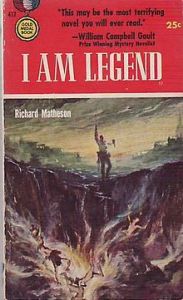 The main issue is the ending, which basically destroys the novel’s entire purpose. The novel uses a complicated conclusion that sheds new light on the vampires (although if it’s sunlight they’re probably not glad of it Hahaha Hahaha….ah. I’ll move on now) and cleverly and effectively deconstructs the typical survival horror narrative in a way that could still be striking even now. Annoyingly the original novel ending shows serious cinematic potential, it’s also incredibly deep and thought provoking, characteristics the film clearly aimed for. A more faithful ending was filmed and ‘tested poorly’, some of it can be watched here. Even so ,the new ending is an unsatisfying replacement that makes the whole film a more boring version of every post-apocalyptic horror story ever made…ever.
The main issue is the ending, which basically destroys the novel’s entire purpose. The novel uses a complicated conclusion that sheds new light on the vampires (although if it’s sunlight they’re probably not glad of it Hahaha Hahaha….ah. I’ll move on now) and cleverly and effectively deconstructs the typical survival horror narrative in a way that could still be striking even now. Annoyingly the original novel ending shows serious cinematic potential, it’s also incredibly deep and thought provoking, characteristics the film clearly aimed for. A more faithful ending was filmed and ‘tested poorly’, some of it can be watched here. Even so ,the new ending is an unsatisfying replacement that makes the whole film a more boring version of every post-apocalyptic horror story ever made…ever.